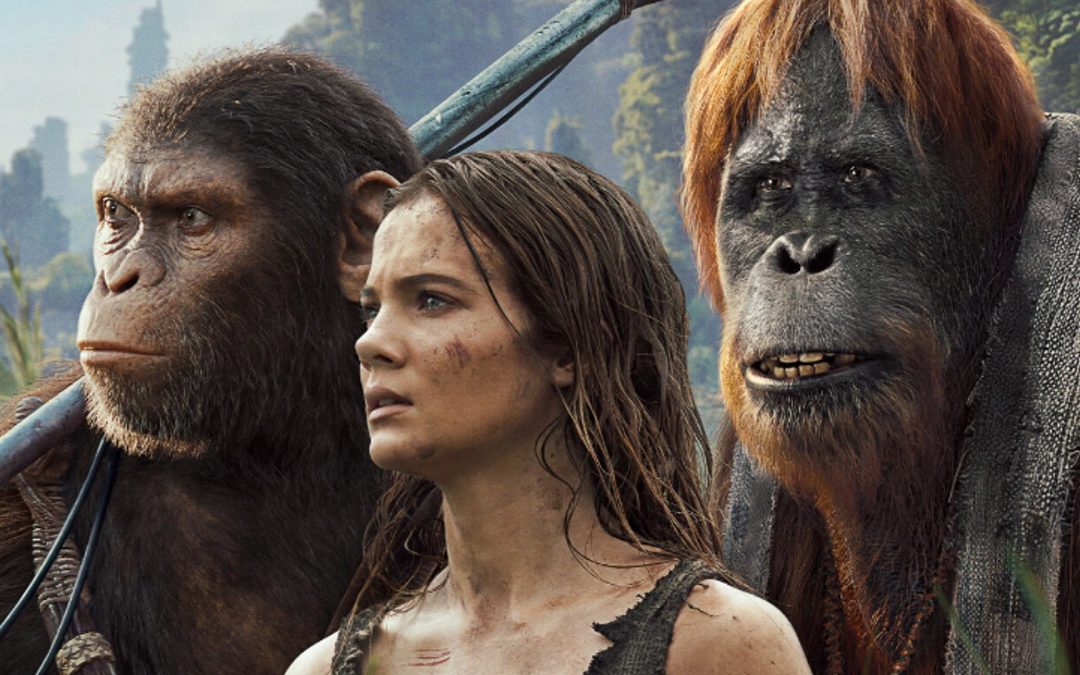Kingdom of the Planet of the Apes (3 stars out of 4)
“Kingdom of the Planet of the Apes” is perfectly good B-list movie filler. It isn’t “turn off your brain” shlock, like a lot of recent franchise offerings, but it isn’t the kind of film that’s going to stick with you, either. It’s not the kind of movie that will get you into a theater, but if you’re looking to get out for the evening, you won’t regret your time watching it.
Wes Ball’s “Kingdom” is the first entry in the “Planet of the Apes” franchise since the conclusion of the “Caesar” trilogy back in 2017. Performed by Andy Serkis, Caesar was the Chimpanzee at the center of a virus that effectively created the Planet of the Apes, elevating the intelligence of apes and numbing the intellect of humans. “Kingdom” takes place “many generations” after Caesar’s death, as the apes have fully asserted dominance over the Earth.
In spite of this dominance and intelligence, the ape world exists in a state of tribal conflict, with few advancements beyond BC-level cultures. The film mostly follows a new protagonist chimp as he teams up with a human to rescue his clan from a local warlord.
Noa (Owen Teague) comes from a clan of Chimpanzees that lives in a kind of symbiotic harmony with eagles (kind of like the owls at Hogwarts). As the film opens, Noa is scaling the towering, overgrown remnants of skyscrapers to reach eagle nests, where he hopes to find an egg that will hatch his own personal Hedwig. But before the clan can complete the ceremony that will usher Noa into adulthood, a warring tribe sacks their village, killing Noa’s father and taking most of the clan hostage.
Noa is able to evade capture, and with the help of an Obi-Wan-like Baboon named Raka (Peter Macon) and a young human girl named Mae (Freya Allan)—who seems immune to the effects of the virus—he sets out to rescue his people. But what he finds at the end of the trail calls everything from ape culture to the real nature of the Planet of the Apes into question.
At a story level, “Kingdom” works as a simple coming-of-age film for Noa, and like all the films in the franchise, it raises questions about culture and species and man’s inhumanity to man (and nature). But nothing is breaking any new ground here, and the various plot twists and revelations do more to just keep things interesting than they do to offer any mind-blowing insight. Without giving too much away, “Kingdom’s” primary story turns out to be peripheral to a larger narrative, and though it ends on a note that leaves things open for future adventures, it’s hard to think that any further films will do more than just keep the franchise going.
As has usually been the case with these movies—and this genre in general—the draw is mostly the quality of the special effects. “Kingdom” never leaves you questioning whether its apes are real or computer-generated—these days it seems we’ve just accepted that most of what we see in science-fiction or even action is coming out of a computer. But its characters do have personality, and are engaging enough to hold your attention.
Again, as a solid escapist option for eager movie-goers, “Kingdom of the Planet of the Apes” is perfectly up to the task. But while it will avoid the controversy and disappointment that has surrounded so many franchise films over the last couple of years, it won’t do much to set things straight for the industry (it’s 2 ½ hour run time, unfortunately, is reflective of recent franchise trends). And as for the ape franchise, “Planet of the Apes” still peaked with Charlton Heston despondent on a beach in 1968.
“Kingdom of the Planet of the Apes” is rated PG-13 for sci-fi action violence and scattered profanity.

